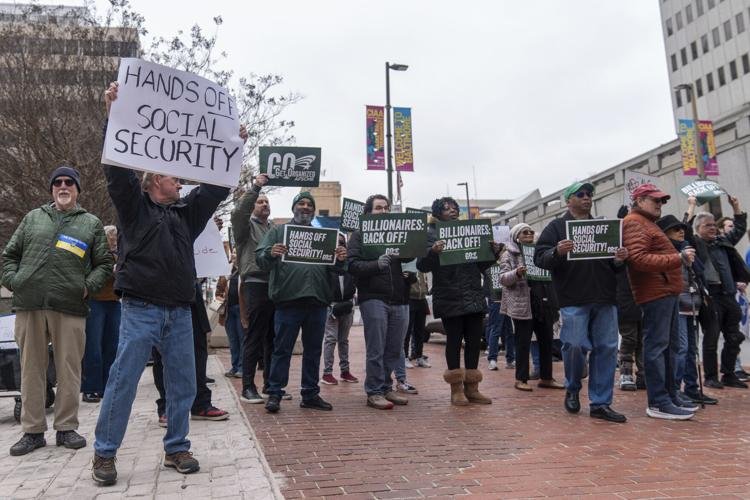
The Evolution and Future of Social Security: Lessons from History
Posted in :
The Future of Social Security: Lessons from the Past
This blog post explores the historical context of Social Security in the United States, its fundamental impact on the working class, and the challenges it faces in the current political climate, especially under the Trump administration.
Imagine a time not so long ago when people faced a harsh reality of aging without support, relying on dwindling family resources or charity. This was the norm before Social Security was established in the 1930s, a groundbreaking move in American social justice. In this post, we’ll delve deep into this history, the ongoing debates around Social Security funding, and what the future may hold under current political influences.
The Foundations of Social Security
Before the establishment of Social Security, life for many Americans was precarious. Imagine being elderly or ill, with no safety net to catch you. Many relied on family or charity, often facing dire circumstances. It was a time when financial insecurity was rampant, and the support systems we take for granted today simply did not exist.
What Life Was Like Before Social Security
In the early 20th century, the concept of retirement was almost non-existent. People worked until they could no longer do so. When they aged, they often found themselves without resources. Many families struggled to support their elderly members, and charity organizations were overwhelmed. The idea of a government-backed safety net was just a dream.
- People faced poverty in old age.
- Charity was the primary means of support.
- Families were often strained by the burden of caring for their elders.
It’s hard to fathom how many lives were affected. The lack of a structured support system led to widespread suffering. Many seniors lived in fear of becoming a burden to their families. This situation was untenable and called for change.
How the Great Depression Catalyzed Its Creation
The turning point came with the Great Depression. The stock market crash of 1929 sent shockwaves through the economy. Unemployment soared to a staggering 25%. Families that once had some stability were now struggling to make ends meet. The financial collapse exposed the urgent need for a safety net.
During this time, the government faced mounting pressure. Labor movements and socialist groups rallied for change. They demanded a system that would protect the most vulnerable. President Franklin Roosevelt responded to this outcry. In 1935, he introduced the Social Security Act, a revolutionary program aimed at providing pensions for those aged 65 and older.
“Social Security was a response to the need for a financial safety net during one of the worst economic collapses in history.”
This act marked a significant shift in how the government viewed its role in citizens’ lives. It was no longer just about individual responsibility; it was about collective welfare.
Role of Political Pressure in Establishing the System
The establishment of Social Security was not just a benevolent act; it was a response to political pressure. The economic crisis had created a perfect storm. Politicians recognized that they needed to act, or risk losing public support. Roosevelt’s administration was keenly aware of the growing unrest among the populace.
In this context, Social Security emerged as a compromise. It was a way to address the immediate needs of the people while also stabilizing the economy. The program began with limited funding, but it was a promise to pay pension checks regardless of life expectancy. This commitment was groundbreaking.
However, the debate surrounding Social Security has continued to evolve. Today, some argue that there isn’t enough funding to sustain the program. Yet, I find it hard to believe that in a country with vast resources, we can’t support our elderly and unemployed. Roosevelt himself once quipped that he would go where the money is, suggesting that taxing the wealthy could provide the necessary funds.
Today, we see echoes of the past in the ongoing discussions about Social Security. The program is often manipulated for political gain. Figures like Donald Trump and Elon Musk have raised concerns about its viability, but the truth is, it’s not just about money. It’s about political power and the willingness of the working class to advocate for their rights.
As we reflect on the foundations of Social Security, it’s crucial to remember its origins. It was born out of necessity during one of the darkest times in American history. The 1930s were a critical period, where financial insecurity was the prevailing theme. We must ensure that the lessons learned from that era guide us in preserving this vital program for future generations.
Modern Challenges: Deconstructing Social Security
Social Security is a topic that stirs up a lot of emotions and opinions. It’s a lifeline for many, yet it’s also a battleground for political debates. Today, I want to dive into some of the modern challenges surrounding Social Security, focusing on three main areas: current political pressures, public misconceptions, and the disparity in contributions between the wealthy and the working class.
Current Political Pressures on Social Security Funding
We live in a time where political pressures are mounting on Social Security funding. It seems like every election cycle, candidates are debating the future of this crucial program. But what’s really at stake?
- Budget cuts initiated by various administrations have raised concerns.
- Many Americans fear losing their financial security.
- Political leaders often use Social Security as a pawn in budget discussions.
It’s essential to remember that Social Security was designed to provide stability. Yet, it’s often caught in the crossfire of political maneuvering. As we’ve seen, the Trump administration’s approach included workforce reductions and increased access to sensitive data. This has only heightened anxiety among millions of Americans.
Public Misconceptions About Funding and Budgeting
There are many misconceptions surrounding how Social Security is funded. For instance, some people believe that the program is running out of money. But is that really true?
Let’s break it down:
- The U.S. has more resources today than when Social Security was first established in the 1930s.
- High-income earners pay a lower percentage into the system compared to lower-income earners.
- Many believe that Social Security is an entitlement, but it’s actually an investment made over a lifetime.
As President Franklin Roosevelt once humorously noted, he would go where the money is. This means taxing wealthier individuals and corporations to ensure the program’s sustainability. Yet, the ongoing debate often ignores this crucial point. Instead, it focuses on the narrative of financial shortfalls.
The Disparity in Contributions by the Wealthy vs. Working-Class
One of the most glaring issues is the disparity in contributions. Did you know that there’s an income cap for Social Security contributions? Currently, individuals earning over $176,000 annually do not pay Social Security taxes on income above this threshold. This creates an unfair system.
Consider this:
- The standard rate of withholding for employees and employers is
7.65%. - Lower-income earners pay this percentage on every dollar they earn.
- Wealthy individuals, however, benefit from exemptions that allow them to escape their fair share.
As I reflect on this, I can’t help but think of the quote:
“The system was designed with fairness in mind, yet the wealthy often escape their fair share.”
This disparity not only affects the funding of Social Security but also places a heavier burden on the working class.
The Importance of Understanding Social Security
The conversation around Social Security is often clouded by misconceptions. Many people don’t realize that Social Security is not just a government program; it’s a safety net for millions of Americans. It’s a promise made to workers who have contributed throughout their lives.
We must advocate for a system that ensures fairness and equity. It’s not just about numbers; it’s about people. Families rely on Social Security for their financial well-being. Young people often bear the emotional burdens of caring for elderly relatives, and the stability provided by Social Security is crucial.
In conclusion, we must navigate these modern challenges with a clear understanding of the facts. Social Security is a vital program that deserves our attention and protection. Let’s not allow political rhetoric to cloud the importance of this essential safety net.
The Future of Social Security: A Call to Action
Social Security is a topic that affects millions of Americans. As I reflect on its future, I feel a sense of urgency. We need to act now. The current system faces significant challenges, and without reform, its sustainability is at risk. But what can we do to ensure that this vital program continues to support those in need?
Potential Reforms to Ensure Sustainability
First, let’s talk about potential reforms. The Social Security system was established during a time of great economic need. Today, we find ourselves in a similar situation. The program needs adjustments to remain viable for future generations. Here are some ideas:
- Increase the payroll tax cap: Currently, only earnings up to $160,200 are taxed for Social Security. By raising or eliminating this cap, we could significantly increase funding.
- Adjust benefits: Modifying how benefits are calculated could help ensure that the system remains solvent. This might mean changing the formula used to determine benefits based on inflation.
- Invest in growth: Instead of keeping funds in low-yield accounts, we could explore investing a portion of Social Security funds in a diversified portfolio to generate higher returns.
These reforms are not just about numbers. They are about people. They are about ensuring that our parents, grandparents, and even ourselves have the support we need in our later years.
Mobilizing Communities for Political Action
Next, we must mobilize our communities. Political action is essential. Many people don’t realize that they have a voice in this matter. We need to advocate for policies that protect and strengthen Social Security. But how do we do that?
- Engage in local politics: Attend town hall meetings. Speak up about the importance of Social Security. Your voice matters.
- Join advocacy groups: Many organizations work tirelessly to protect Social Security. By joining these groups, we can amplify our voices.
- Educate others: Share information about Social Security with friends and family. The more people understand the issues, the more likely they are to take action.
As I think about the future, I realize that younger generations have a stake in preserving Social Security. It’s not just an issue for the elderly; it’s about our collective future. We must unite to ensure that this program remains intact.
Understanding the Social Responsibility in Funding Pensions
Finally, we need to understand our social responsibility in funding pensions. Social Security is not merely a government program; it’s a promise. A promise that we, as a society, make to one another. When we contribute to Social Security, we are investing in our community’s future.
As I reflect on the words of a wise advocate,
“Preserving Social Security means fighting for each other’s futures as well as our own.”
This statement resonates deeply. It reminds us that our actions today will impact not just our lives, but the lives of future generations.
Currently, about 170 million American workers contribute to Social Security. This vast network of contributors is a testament to the program’s importance. However, we must ensure that these contributions are used wisely and effectively.
In conclusion, the future of Social Security is in our hands. We must advocate for reforms that ensure its sustainability. We must mobilize our communities for political action. And we must recognize our social responsibility in funding pensions. Together, we can preserve this essential program for ourselves and for future generations. Let’s not wait until it’s too late. The time to act is now.
TL;DR: Understanding the origins and significance of Social Security reveals its importance today, especially as current leaders question its sustainability under the pressure of political and economic factors.Collapse
SocialSecurityHistory, TaxationFairness, PoliticalPower, EconomicInequality, TrumpAdministration, SocialSecurityReforms, RooseveltPrograms, Working-classRights
#SocialSecurityReforms, #SocialSecurityHistory, #TrumpAdministration, #RooseveltPrograms, #TaxationFairness, #PoliticalPower, #EconomicInequality, #Working-classRights#SocialSecurity, #NewDeal, #RetirementPolicy, #EconomicJustice, #PoliticalReform, #PublicPensions, #SocialSafetyNet, #WealthGap, #RooseveltLegacy, #FutureOfWork

